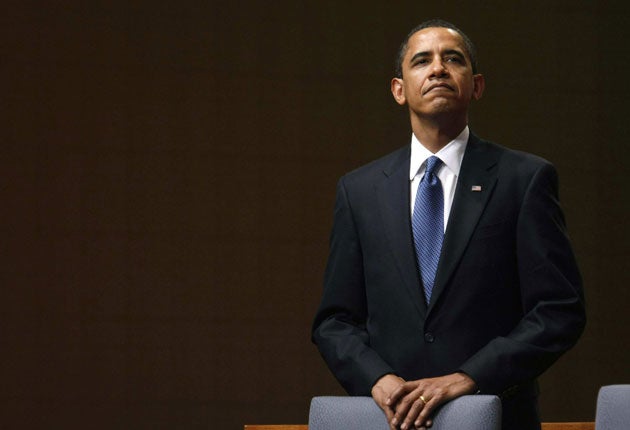Obama attacked from all sides over CIA memos
Former Bush aides condemn release of sensitive documents / Human rights groups criticise immunity given to interrogators

Your support helps us to tell the story
From reproductive rights to climate change to Big Tech, The Independent is on the ground when the story is developing. Whether it's investigating the financials of Elon Musk's pro-Trump PAC or producing our latest documentary, 'The A Word', which shines a light on the American women fighting for reproductive rights, we know how important it is to parse out the facts from the messaging.
At such a critical moment in US history, we need reporters on the ground. Your donation allows us to keep sending journalists to speak to both sides of the story.
The Independent is trusted by Americans across the entire political spectrum. And unlike many other quality news outlets, we choose not to lock Americans out of our reporting and analysis with paywalls. We believe quality journalism should be available to everyone, paid for by those who can afford it.
Your support makes all the difference.The White House was engulfed by a maelstrom of anger yesterday after its decision to release memos from the Bush era providing legal cover for "enhanced" interrogation techniques in secret CIA prisons. At the same time, it made promises to protect those who implemented them from prosecution.
The act of releasing the memos with almost no blacking out of sensitive sections was attacked by two senior former Bush aides. Michael Hayden and Michael Mukasey, who served respectively as CIA director and US attorney general, said their publication "was unnecessary as a legal matter, and is unsound as a matter of policy".
Perhaps more controversial was the decision to couple their publication with assurances from Barack Obama and his Attorney General, Eric Holder, that no one who carried out interrogations using the now disavowed techniques, including forcing detainees to stand naked for hours and slamming them against walls, would face prosecution.
Some deemed the decision as fitting a pattern that Mr Obama has set, which involves honouring his campaign promises – in this case to lift the veil of secrecy on the way the "War on Terror" was waged by his predecessor – while rarely going as far as some of his supporters wanted or expected.
If Mr Obama had hoped to draw a line under the shame of how the CIA treated terror suspects at secret overseas prisons, he has failed. Even if he and Mr Holder can guarantee immunity for CIA interrogators, an inquiry is still likely to be opened by members of Congress. Nor is it clear they could be protected from prosecution under international laws.
Among those expressing their dismay at the legal immunity was a former Guantanamo detainee now living in Egypt. "All of us in Guantanamo never had hope or faith in the American government," said Jomaa al-Dosari, a Saudi released last year. "We only ask God for our rights, and to demand justice for the wrongs we experience in this life."
Human rights groups also deplored giving immunity to those who practised interrogation, which critics say amounted to illegal torture. "The release of CIA memos on interrogation methods by the US Department of Justice appears to have offered a get-out-of-jail-free card to people involved in torture," Amnesty International said.
"It is one of the deepest disappointments of this administration that it appears unwilling to uphold the law where crimes have been committed by former officials," said the Washington-based Centre for Constitutional Rights. The Centre argued that it was not just the interrogators who should face scrutiny, but those directing them.
"Whether or not CIA operatives who conducted water boarding are guaranteed immunity, it is the high-level officials who conceived, justified and ordered the torture programme who bear the most responsibility for breaking domestic and international law, and it is they who must be prosecuted," it said.
The memos, written by senior Justice Department experts in 2002 and 2005, were designed to give the CIA reassurance that the so-called "enhanced" techniques would pass legal muster.
The decision to release them did not come easily to Mr Obama, who waited weeks as debate raged both within the White House and between the various agencies involved. While the Justice Department broadly backed their publication, the CIA did not, for fear their contents would aid terror organisations.
All the information in the memos, set out by the Office of Legal Counsel in the Justice Department, was categorised as top secret and should have remained so, argued Mr Mukasey and Mr Hayden in a joint article published in The Wall Street Journal.
Join our commenting forum
Join thought-provoking conversations, follow other Independent readers and see their replies
Comments